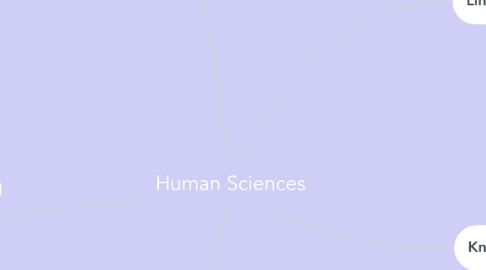
1. Knowledge Framework
1.1. Scope/Application
1.1.1. The study of human nature in a systematic and scientific way
1.1.2. Investigation and explanation for human behaviour and development
1.1.3. Attempts to explain irrational behaviours in a rational way
1.1.4. Ethical considerations, e.g. certain psychology experiments can risk the subject's mental health
1.2. Concepts/Language
1.2.1. Main concept of human sciences: To understand the meaning of various social practices from the inside as they are understood by the agents themselves
1.2.2. Nature vs. Nurture; Whether human behaviour is inherited or learned
1.3. Methodology
1.3.1. Similar to the approaches used in natural sciences
1.3.2. Observational methods, case studies, experiments
1.3.3. Concrete facts is nearly unobtainable in this AOK; theories about human nature are either supported or refuted
1.3.4. Theories can be modelled in order to attempt to explain human behaviour, e.g. multi-store model of memory explaining how we store information
1.3.5. Certain ethical guidelines must be followed when doing experimentation
1.3.5.1. DON'T: Harm or deceive participants
1.3.5.2. DO: Allow participants to withdraw if they are uncomfortable, maintain participant anonymity, brief and debrief participants, and maintain informed consent
1.4. Historical Development
1.4.1. The history of human sciences has mostly influenced its ethical guidelines
1.4.2. Previous studies in conformity and other investigations in human nature have allowed for growth in the way that experiments in human sciences are conducted
1.4.3. Historical events allow for a new area of investigation, e.g. experiments did not always require informed consent which is seen in Tuskegee experiments and Mengele's experiments in WWII
2. WOKs
2.1. Language
2.1.1. Vitally important way of communicating knowledge on human behaviour
2.2. Memory
2.2.1. What we think we know, we remember; vital to our sense of who we are
2.3. Emotion
2.3.1. It is often the case that we know things emotionally with more certainty than by any other way of knowing
2.4. Sense Perception
2.4.1. Our senses gives us the initial information that we need to motivate us to discover further
2.5. Reason
2.5.1. Working out things logically let's us go beyond with what we had discovered using sense perception
3. Real Life Situation
3.1. The Little Albert Experiment, 1920
3.1.1. A John’s Hopkins University professor, Dr. John B. Watson, and a graduate student wanted to test a learning process called classical conditioning. It involves learning involuntary or automatic behaviours by association, and Dr. Watson thought it formed the bedrock of human psychology.
3.1.2. A nine-month-old toddler, dubbed “Albert B,” was volunteered for Dr. Watson and Rosalie Rayner‘s experiment. Albert played with white furry objects, and at first, the toddler displayed joy and affection. Over time, as he played with the objects, Dr. Watson would make a loud noise behind the child’s head to frighten him. After numerous trials, Albert was conditioned to be afraid when he saw white furry objects.
3.1.3. The study proved that humans could be conditioned to enjoy or fear something, which many psychologists believe could explain why people have irrational fears and how they may have developed early in life.
4. Link to Personal Knowledge
4.1. This area of knowledge is important to the individual because it attempts to explain humankind both at an individual level and at a social level
4.2. Most theories in human sciences stem from the personal experiences of the individual
4.3. It is important for the individual to understand that there is no fact in the human sciences, only theory, and thus everything is still subject to investigation
4.4. This approach assumes that there is a normal behaviour
5. Knowledge Question
5.1. To what extent does emotion play a role in human behaviour?
5.1.1. TOK terminology: To what extent
5.1.2. WOK: Emotion
5.1.3. AOK: Human Sciences
5.1.4. The chosen RLS recites a psychology study on human conditioning, and how the experiment had an effect on the subject's emotions. This knowledge question strives to further explore the role of emotion in not only conditioning but human behaviour and actions overall.

